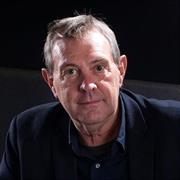
Dr. Marius Foley
Details
-
Department: School of Design
-
Campus: City Campus Australia
-
marius.foley@rmit.edu.au
-
ORCID: 0000-0002-0651-2061
Open to
- Masters Research or PhD student supervision
About
As Program Manager for the Master of Design Futures at RMIT University, Marius leads an interdisciplinary initiative that redefines how design can drive change. A key focus of the program is developing new evaluative practices that enable iterative change and align human-centered designers to driving human and planetary change.
The program attracts professionals from industries including healthcare, government, and technology, emphasising service design, strategic design, and design for transformative change. Rather than focusing solely on execution, Marius challenges participants to think like systems leaders, applying design methodologies to solve real-world challenges.
The power of collaboration in design
A core tenet of Marius’s work is collaboration—bringing together diverse stakeholders to co-design solutions. He co-developed the Tactile Tools™ methodology alongside Dr. Leah Heiss, a groundbreaking approach to interdisciplinary problem-solving. Applied in industries from healthcare to engineering, this framework enables teams to:
- Form interdisciplinary working groups
- Understand the lived experiences of stakeholders
- Map relationships and identify barriers to change
- Develop and test human-centered solutions iteratively
By embedding collaboration at the core of design processes, Marius demonstrates how organizations can unlock innovative solutions that would be impossible through siloed thinking.
Building design-minded leadershipMarius’s influence extends beyond academia—his work with senior leaders and executives underscores the growing recognition that design is a core leadership competency. Today, the ability to think systemically, navigate ambiguity, and rapidly prototype is essential for business leaders operating in volatile, uncertain, complex, and ambiguous environments.
The Master of Design Futures program is designed not just for designers but for professionals across industries looking to integrate design methodologies into corporate and public-sector decision-making. Marius’s approach aligns with the broader shift in global organisations, where design-led strategies are embraced by firms like Arup, IBM, and the Centre for Public Impact ANZ.
Designing for impactMarius’s contributions to the field of design go beyond theory—his work is actively shaping industries and organisations. Whether reshaping design education, mentoring leaders, or applying human-centered design to societal challenges, his approach exemplifies the transformative power of design when applied strategically.
His focus is not just on changing how we design, but on rethinking how we lead. In a world demanding creative, agile, and human-centered approaches to change, Marius offers a roadmap for integrating design as a strategic function in business and beyond.
For leaders looking to make design a core part of their decision-making processes, Marius’s work underscores a key lesson: Design is not just about making things look better—it’s about making systems work better.
Industry Experience:
2006–present RMIT University
2000–2006 University of Wollongong NSW
1983–present Marius Foley Media, Melbourne, Stanwell Park
1979–83 Backyard Press, Champion Books Melbourne
Professional interests:
Human and non-human centred design
Communication in design practice
Knowledge commons in media and design
Designing media spaces
Creative consortia: building and maintaining institutional and community networks of practitioners
Contemporary publication design
Co-creative and multidisciplinary education strategies
Experiential education frameworks in global media and design practice
2010 LTIF: Future Makers Future Markets, educational research into social media practice
2011 Salford Champion – liaison with Salford University and MediaCityUK
2012 Convenor, Public Media Social Knowledge on knowledge transfer in public media
2012 Partnership management for Communication Design Program
2012 Co-lead, Global Practice Study Tour, UK
Grants and awards:
ABC Roundtables Public Media Social Knowledge: Media and Communication R&I Visiting Scholar Grant, 2010–2011
Learning and Teaching Innovation Fund (LTIF): Future Makers Future Markets, social media in media education (a forward looking work integrated learning project, 2010
ABC POOL redesign: ACID [Australian Centre for Interaction Design] review and design proposition: project leader, 2009
Foley , M., Bunt, B., Schiemer, G., University Research Council, University of Wollongong Internal Research Grants, 2007–2008: ‘ABC Exchange Feasibility Study: a partnership between ABC Radio National, UOW and UTS
Conference and workshop presentations
Foley, M., ‘Co-creation as a model for independent participatory experiences’, Collaboration in Experimental Design Research Symposium, RED Objects, COFA Sydney, 2011
Foley, M., Listening through interaction, The Social Not the Medium is the Message | workshop, University of Massachusetts Boston April 2011
Foley, M. ‘Future Makers Future Markets’ in panel presentation, Screen Futures, ATOM, Melbourne 2011
Foley, M., ‘Future Makers Future Markets’, LTIF Expo, 2011
Foley, M., Panel member 'Educating the next generation of design thinkers', with Steve Heller and Lita Talarico, New York School of Visual Arts, Sue Bennet, UOW
Foley, M., Ellmers, G., 2007, ‘Introducing reflective strategies informed by problem-based learning, to enhance cognitive participation and knowledge transference in graphic design education’, ConnectEd Design Conference Presentation, Sydney 2007 (referred)
Supervisor projects
- The Archaeology of Service Design: How To Unravel, Locate, Surface, and Transmit the Significance and Meaning of Place in a Complex Heritage Setting
- 6 Oct 2021
- The Politics of Communicating Complexity: Editorialising Data and the Visual
- 25 Sep 2015
Teaching interests
Research interests
Research/ Current projects
PhD research: The Design Conversation: a dissonant and dialogic space
Public Media Social Knowledge: Convener of a series of roundtable discussions leading to a proposal for a knowledge transfer consortium around contemporary media practice
ABC POOL: (http://www.pool.org.au/) Interaction research and redesign of a social and participatory media space
Design Futures: emerging research group founding member
Social Media Research Group: research founding member
Villa Alba Curiosities: the museum as a design resource.
The Island Project, in collaboration with Conservation Volunteers Australia
Cross cultural communication design: Asian Pacific work integrated learning project